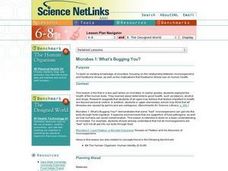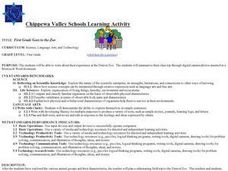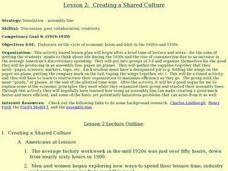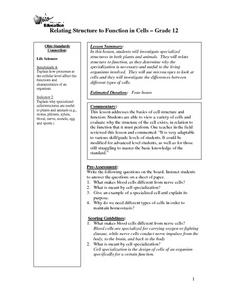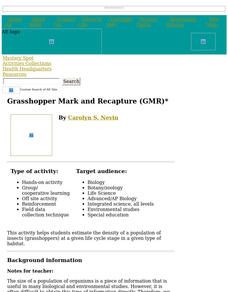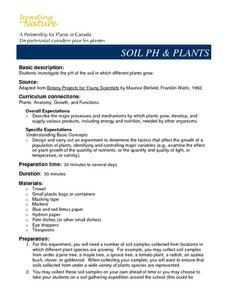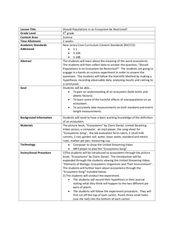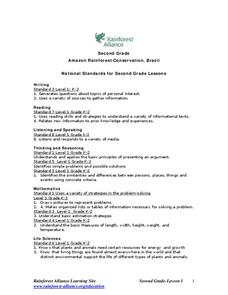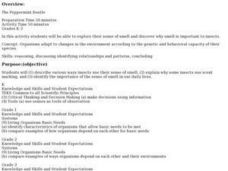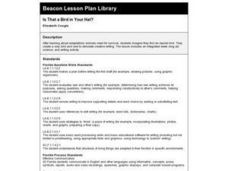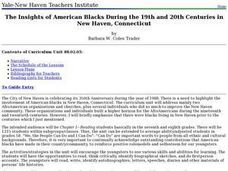Curated OER
Dinosaurs 1: Where Are the Dinosaurs?
Learners study dinosaurs. In this dinosaur lesson, students watch a web based video about dinosaurs before discussing what they liked about the dinosaurs, telling about the sounds they heard, and explaining what the Earth looked like....
Curated OER
MICROBES 1: WHAT'S BUGGIN YOU?
Middle schoolers use existing knowledge of microbes, focusing on the relationship between microorganisms and foodborne illness, as well as the implications that foodborne illness has on human health.
Curated OER
Photosynthesis
Learners conduct a variety of experiments on photosynthesis. In this biology activity, students identify the factors required for the process to occur. They perform computerized experiments to test the amount of oxygen produced when...
Curated OER
Where Do Birds Live? Cavity Nesters of the Watsonville Wetlands
Students compare and contrast primary and secondary cavity nesters. In this life science lesson, students explore the different types of nests that birds make. They play a team game to apply what they learned.
Curated OER
First Grade Goes to the Zoo
First graders summarize their trip to the zoo. In this summarizing lesson plan, 1st graders will study animals that they may see at the zoo including their characteristics and habitats. Once the trip is done, they create a word document...
Curated OER
Creating a Shared Culture
Learners simulate working on an assembly line in a shared culture. In this consumerism lesson plan, students participate in a lecture and note-taking session before working on a simulated assembly line. They work in a timed situation to...
Curated OER
Relating Structure to Function in Cells
Twelfth graders investigate specialized structures in both plants and animals. They relate structure to function, as they determine why the specialization is necessary and useful to the living organisms involved. They use microscopes...
Curated OER
Build Working Models With household Items
Students follow the illustration, and cut out foam board according to the pattern. They assemble the small parts by gluing. Once the glue is dry, students tape the end of the bottom and top clipper boards, they slide toothpicks through...
Curated OER
The Dance of the Butterfly
Learners explore butterfly life cycles and movement. For this integrated fine arts and biology life cycle lesson, students listen to the book The Very Hungry Caterpillar by Eric Carle and identify the related life cycle stages. Learners...
Curated OER
Grasshopper Mark and Recapture (GMR)
Learners estimate the density of a population of insects (grasshoppers) at a given life cycle stage in a given type of habitat.
Curated OER
Every Vote Counts
Students participate in an activity designed to increase student awareness and participation in the voting process.
Curated OER
Soil pH & Plants
Students investigate the pH of the soil in which different plants grow. They design and carry out an experiment to determine the factors that affect the growth of a population of plants, identifying and controlling major variables...
Curated OER
Inheritance Patterns in Zorks
In this inheritance patterns worksheet, students create a visual of a Zork using chromosome strips to represent alleles from the father and the mother to determine the traits in the offspring. Students translate the genotype to the...
Curated OER
Should Populations in an Ecosystem be Restricted?
Fourth graders experiment to determine how overpopulation effects ecosystems specifically plants. In this ecosystem lesson, 4th graders conduct an ecosystems experiment after listening to Claire Daniel's, Ecosystems. They watch a video,...
Curated OER
Rhythm and Art: Gesture Drawing
Students make connection between music and art. In this integrated arts lesson plan, students complete gesture drawing activities as they listen to Cuban, flamenco, classical, jazz, and contemporary music.
Curated OER
Ecology of the Savanna-Forest Boundaries in Central Brazil
Students explore photosynthesis. In this photosynthesis instructional activity, students label parts of photosynthesis and take notes. Students conduct experiments on leaves, make observations and record their findings.
Curated OER
The Physics of the Planets: How 16th and 17th Century Physicist Helped Us Understand Our Solar System
Eighth graders draw the paths of the planets in the solar system. In this astronomy lesson, 8th graders calculate speed of objects using distance and time information. They research about the work of scientists in the 16th and 17th century.
Stanford University
Philippine-American War Political Cartoon
Students investigate the Philippine War. In this propaganda lesson, students read the a timeline of events during the Philippine War. Students evaluate Philippine propaganda cartoons from the period.
Curated OER
Amazon Rainforest Conservation, Brazil
Students explore rain forests. In this rain forest lesson, students participate in a "BioBlitz" of their schoolyard, observing and recording every living thing in a designated area. Students visit websites about rain forests to...
Curated OER
The Peppermint Beetle
Learners describe various ways insects use their sense of smell, and examine why some insects use scent marking. They conduct a scent hunt, searching for a particular scent on the trees on school grounds.
Curated OER
The Proof of the Century!
Young scholars do Web research in the field of mathematics. They explore mathematical proofs and apply them to the Pythagorean theorem. They also explore the general ideas of Fermat's Last Theorem
Curated OER
Is That a Bird in Your Hat?
Second graders imagine they find an injured bird. They create a clay bird and nest to stimulate creative writing. The lesson includes an integrated week-long art, science, and writing activity.
Curated OER
Global Women and Poverty
Students examine poverty and women in Senegal through a video. They work together to gather research about economic prosperity in different countries. They share their information with the class.
Curated OER
The Insights of American Blacks During the 19th and 20th Centuries in New Haven, Connecticut
Students examine the contributions of African Americans in New Haven, Connecticut in the 19th and 20th centuries. After being introduced to new vocabulary, they review the elements of autobiographies and read excerpts of African...



